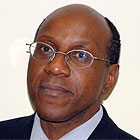"Army-backed leader cements grip in Madagascar
By Richard Lough
ANTANANARIVO (Reuters) - Madagascar's new president, Andry Rajoelina, celebrated and consolidated power on Wednesday after being appointed by the Indian Ocean island's military in a move drawing international disapproval.
Rajoelina, a 34-year-old former disc jockey who is now the youngest and newest president in Africa, partied with supporters in the street after meeting his ministers to plan strategy.
His priorities are anti-poverty programmes expected by locals, handling international concern at his ascent to power and controlling some dissent in the armed forces.
"We will bring about the return to a normal life, to security and above all national reconciliation, which is at the heart of democracy," he told several thousand supporters celebrating in the capital Antananarivo's May 13 square.
In a boost to Rajoelina's legitimacy, Madagascar's Constitutional Court issued a statement endorsing the takeover.
He is to be formally sworn in on Saturday.
President Marc Ravalomanana, 59, resigned on Tuesday after most of the military backed his rival, who had led weeks of anti-government strikes and protests.
The unrest killed at least 135 people, devastated the $390 million-a-year tourism sector and worried multinationals with investments in the mining and oil industries.
The outcome was also a slap in the face for the African Union (AU), which has censured recent violent transfers of power that have damaged the continent's reputation with investors.
Nervous of more turmoil, the U.S. embassy ordered non-essential staff and their families to leave Madagascar.
Experts said Western donors' disquiet at the manner of Rajoelina's rise would probably be short-term.
"With so many people below the poverty line I can't see the international community abandoning Madagascar in the long run, and (Rajoelina) knows this," Lydie Boka, of Paris-based risk group StrategiCo, told Reuters.
While the military was crucial in installing the opposition leader, analysts say he also has the backing of exiled former president Didier Ratsiraka and his allies. Some analysts said former colonial ruler France gave him tacit support too.
Ravalomanana's whereabouts were unclear. The opposition had accused him of corruption and of losing touch with the majority of the population who live on less than $2 a day.
There was a heavy military presence at the palace where Ravalomanana capitulated. A Reuters TV witness saw broken windows and furniture, as well as a crowbar lodged in the door of a safe. It was not clear whether departing presidential guards, the army or the public had ransacked the building.
FRENCH CONCERN
According to Malagasy law, the head of parliament's upper house should have taken over after the president's resignation and organised an election within two months on the island of 20 million off Africa's southeastern coast.
Instead, Rajoelina -- who is six years too young to be president under the constitution -- now heads a transitional government which has pledged to hold a poll within two years.
Pierrot Rajaonarivelo, a former deputy premier and close ally of the exiled Ratsiraka, said that was much too long.
"Why and for what reason is he taking 24 months as his starting point?" Rajaonarivelo told Reuters in Paris. "I'm among the people behind him (Rajoelina) but I think as far as his approach is concerned, there's a bit of amateurism there."
France echoed that concern.
"The waiting period of 24 months that has been announced for the organisation of new elections is too long. In this type of exceptional situation, the international community wishes to see that democracy can be expressed as rapidly as possible," the Foreign Ministry said, adding that aid flows would continue.
The AU had demanded the constitution be respected scrupulously. But the fact the army refused to take over on Tuesday, as Ravalomanana had requested, means the AU may not brand it a coup, which would have meant suspending Madagascar.
"The fact the president let go of power offers the international community a legal footing (for relations with the new government) if it is looking for one," local constitutional law expert Jean-Erik Rakotoarisoa told Reuters.
After recent coups in Mauritania and Guinea as well as the killing of Guinea-Bissau's leader, Ravalomanana's fall raises doubts over the durability of democracies elsewhere in Africa.
South African President Kgalema Motlanthe, who is chairman of the SADC regional trade bloc, denounced the change of power.
SADC executive secretary Tomaz Salamao said the bloc had scheduled a meeting in Swaziland on Thursday to discuss how to handle the situation, which he said was sad and unacceptable.
Still, some analysts said the departure of Ravalomanana -- a self-made dairy tycoon -- would at least end the bloodshed for now and soothe the concerns of foreign investors.
"The transitional government will probably not take aim at foreign investors in the extractive industries, in part because it will be desperate for those revenues," said Philippe de Pontet, Middle East and Africa analyst at Eurasia group."









































